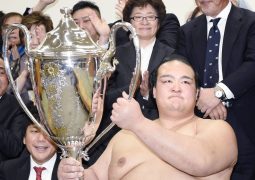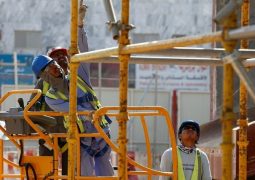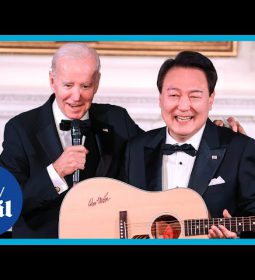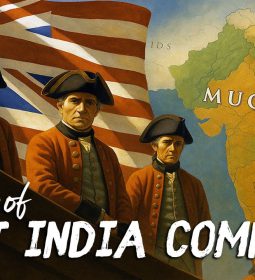Chinese firm behind the ‘Amazon Coat’ hits jackpot in U.S., eschews China
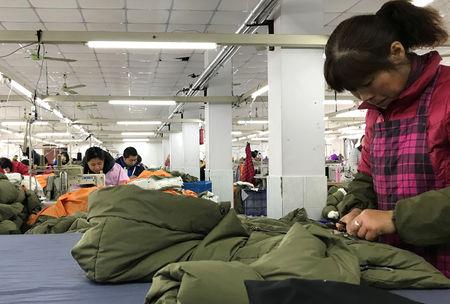
By Pei Li and Melissa Fares
JIAXING, China/NEW YORK (Reuters) – When Kevin Chiu left his job in 2012 to try his luck at starting an online apparel business in a rural Chinese city, his main goal was to carve out more time to spend with his wife and newborn child.
It never entered his mind that his Orolay puffer jacket would become a huge hit, celebrated as the ‘Amazon Coat’ in U.S. social and traditional media – and held up as a budding rival to premium brand Canada Goose.
Using duck down sourced from China’s Hebei and Anhui provinces, the polyester coats are priced between $80 and $139. By contrast, Canada Goose jackets start from about $575 in the United States.
“We made more money in January than we did for the whole of 2017,” Chiu, 32, told Reuters at his factory in the eastern Chinese city of Jiaxing.
He estimates his firm made $5 million in sales last month and expects to bring in $30-$40 million this year. U.S. sales – almost all of which are sold through Amazon.com Inc – account for 70 percent of total revenue.
Orolay’s success is, however, not just a tale of competitive pricing and a design that found favour with U.S. consumers.
Chiu is among a wave of Chinese merchants that have benefited from measures introduced by Amazon in recent years that have made it easy for overseas vendors to sell on its site.
That’s provoked concerns among U.S. sellers on Amazon that they are being outgunned. And in industries such as apparel, experts say brick-and-mortar retailers cannot ignore the threat posed by the influx of small brands, many of which are based in China.
“It’s the impact, collectively, that’s happening in the industry from all of these brands. When you add them up, they’re just all taking market share,” said Robert D’Loren, chief executive of Xcel Brands Inc, whose merchandise is sold at Macy’s Inc and on Amazon.com.
Amazon declined to comment on the view that U.S. firms are being undercut by Chinese merchants using its site. It does not break down the number of sellers on its sites by country.
The number of Chinese merchants on Amazon is set to grow further as fierce competition and rising costs have made it less attractive to sell on local e-commerce sites like Alibaba Group Holding Ltd’s Tmall, analysts say.
Indeed, Chiu no longer sells in China. Orolay’s other markets are Europe, Japan, Taiwan and Australia.
“We did sell on Alibaba in the early days…but competition in China is stiffer,” he said, adding that increased costs to use local sites was also a factor.
In addition to fees to use Chinese e-commerce sites, sellers also face other costs such as investing in customer service teams. Alibaba declined to respond to Reuters questions about whether costs for vendors had increased.
Analysts say the number of Chinese merchants selling on Amazon’s U.S. site began to pick up over the last five years after it introduced measures that allowed sellers worldwide to store products at Amazon warehouses and provided help shipping those goods to customers.
Late last year, the retail giant also started a program that refers China-based sellers to local lenders. By comparison, Amazon offers loans to selected U.S., UK and Japan-based small businesses that sell on its site.
Chiu credits Amazon for much of the firm’s success but is thinking of branching out, saying offers from retailers include invitations to sell online from Walmart Inc and U.S. shopping site Rue La La.
A Walmart spokeswoman said the firm had no agreement in place with Orolay. Rue La La did not respond to requests for comment.
Expansion plans include extending Orolay’s product line to cotton clothing and men’s outerwear. But for now, Chiu is still marvelling at how his business has become so successful in a market he barely knows.
“I went to New York for vacation twice last year, and was so excited to see that people on the street are wearing our jackets,” he said.
“I was very eager to ask them how they like our jackets, but didn’t do it because I don’t speak much English.”
(Reporting by Pei Li in Jiaxing, China and Melissa Fares in New York; Writing and additional reporting by Brenda Goh in Shanghai; Editing by Vanessa O’Connell and Edwina Gibbs)
- Previous In his grandfather’s footsteps, North Korea’s Kim arrives in Vietnam
- Next Escalation would lead to situation out of Narendra Modi’s and my control: Imran Khan





